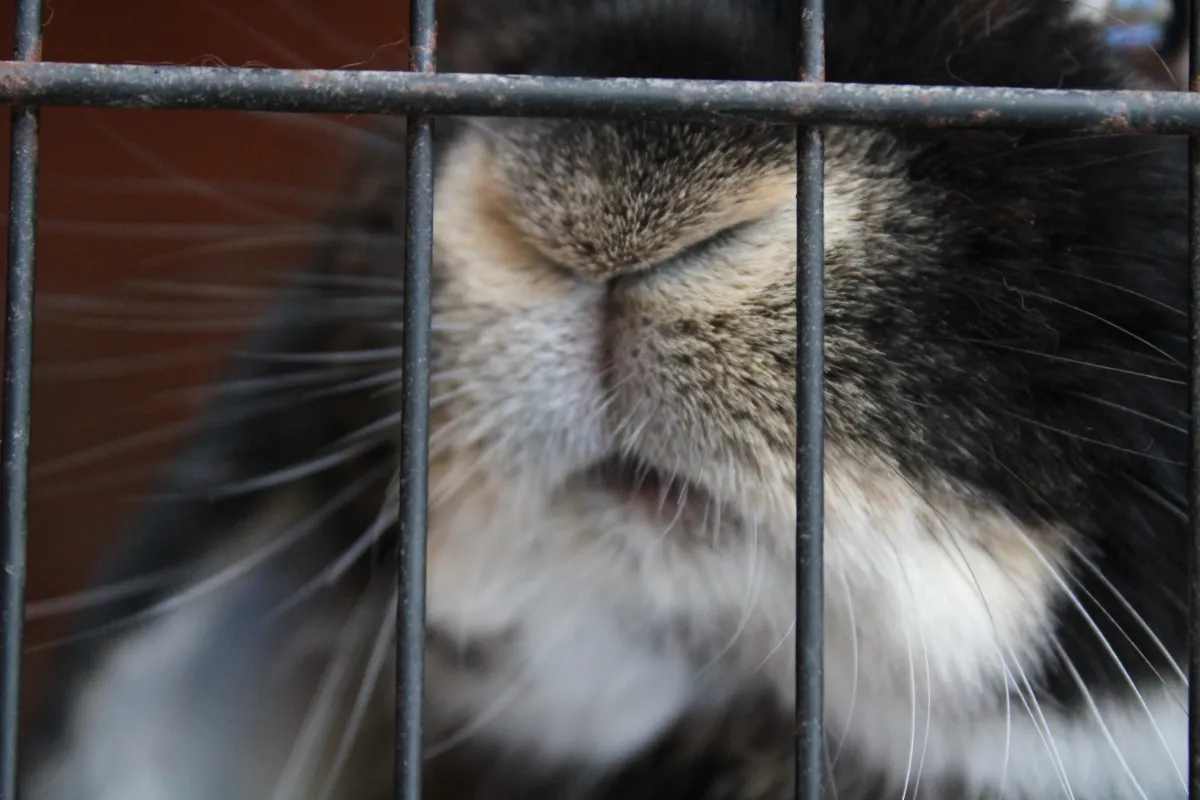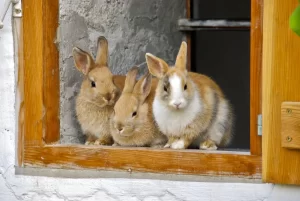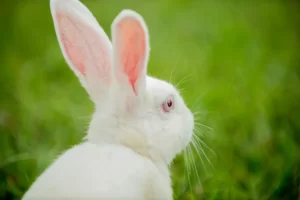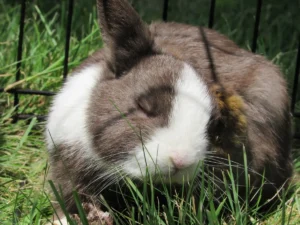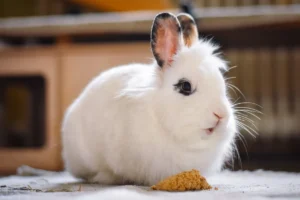Have you ever wondered how a rabbit’s sense of smell is so incredibly good? Well, let us take you on a journey inside the remarkable anatomy of a rabbit’s nose.
Through this allegory, we will explore how their sense of smell works, the range of scents they can detect, and even compare their olfactory abilities to ours.
Prepare to be amazed by the vital role smell plays in a rabbit’s social life, survival, and their unparalleled ability to find food.
In This Article
- 1 Key Takeaways
- 2 The Anatomy of a Rabbit’s Nose
- 3 How a Rabbit’s Sense of Smell Works
- 4 The Range of Scents Rabbits Can Detect
- 5 Rabbit Vs. Human: a Smell Comparison
- 6 The Role of Smell in a Rabbit’s Social Life
- 7 How Rabbits Use Their Sense of Smell to Find Food
- 8 The Importance of a Rabbit’s Sense of Smell in Survival
- 9 Frequently Asked Questions
- 10 Conclusion
Key Takeaways
- Rabbits have a powerful sense of smell with a complex network of olfactory receptors and a unique vomeronasal organ.
- Their sense of smell plays a crucial role in communication, mating, and detecting danger, enhancing their survival in their environment.
- Rabbits have a much stronger sense of smell compared to humans, with 100 million olfactory receptors and a larger nasal cavity for enhanced scent detection.
- Environmental pollution can impair a rabbit’s sense of smell, affecting their ability to detect predators and locate food sources. Conservation efforts should focus on protecting their well-being and minimizing pollution.
The Anatomy of a Rabbit’s Nose
You should know that a rabbit’s nose has an exceptional sense of smell. The structure of a rabbit’s nose is specially adapted to enhance their olfactory sensitivity.
Rabbits have a large nose with two nostrils, allowing them to take in a larger amount of scent particles from the environment. Inside their nose, they have a complex network of olfactory receptors that help them detect various odors. These receptors are highly sensitive and can distinguish between different smells, enabling rabbits to identify predators, locate food sources, and communicate with other rabbits.
Additionally, rabbits have a unique nasal structure called the vomeronasal organ, which allows them to detect pheromones and communicate with other rabbits through chemical signals.
Overall, the intricate structure of a rabbit’s nose plays a crucial role in their ability to navigate their surroundings and ensure their survival.
How a Rabbit’s Sense of Smell Works
If you want to understand how a rabbit’s sense of smell works, it’s important to learn about the intricate structure of their nose and the role it plays in their olfactory abilities.
Rabbits have an incredibly powerful sense of smell, which allows them to detect even the faintest of scents. Their noses are equipped with a specialized organ called the vomeronasal organ, or VNO, which helps them detect pheromones and other chemical signals.
This organ is located in the roof of their mouth and connects to the nasal cavity. When a rabbit comes across a scent, they’ll often raise their head and extend their neck, allowing them to direct the scent toward their VNO for further analysis.
This sophisticated olfactory system is crucial for a rabbit’s survival, as it helps them communicate with other rabbits, identify potential mates, and detect predators or danger in their environment.
The Range of Scents Rabbits Can Detect
Rabbits can detect an impressive range of scents, allowing them to navigate their environment and communicate effectively with other rabbits. Their sense of smell is highly developed and plays a crucial role in their survival. Here are some fascinating facts about the range of scents rabbits can detect:
- Scent discrimination: Rabbits have the ability to discriminate between different scents with remarkable precision. They can distinguish between the scent of a predator and that of a friendly rabbit, helping them identify potential threats in their surroundings.
- Scent marking: Rabbits use scent marking as a way to communicate with other rabbits. They have scent glands located on their chin, cheeks, and anal area, which secrete pheromones. By rubbing these areas on objects or other rabbits, they leave behind their unique scent, conveying information about their territory and reproductive status.
- Sensitivity to food scents: Rabbits have a keen sense of smell when it comes to finding food. They can detect the scent of fresh, succulent plants from a considerable distance, allowing them to locate food sources even in dense vegetation.
- Recognizing familiar scents: Rabbits have the ability to remember and recognize the scents of other rabbits. This helps them identify family members, mates, or familiar individuals within their social groups.
Understanding the range of scents that rabbits can detect provides valuable insights into their sensory capabilities and social behavior. By appreciating these remarkable abilities, we can better serve our furry friends and ensure their well-being.
Rabbit Vs. Human: a Smell Comparison
When it comes to smelling, humans simply can’t compete with the extraordinary olfactory abilities of rabbits. While humans have around 5 million olfactory receptors, rabbits have a staggering 100 million. This means that rabbits have a much greater ability to detect scents in their environment.
They’re able to distinguish between different types of smells and even detect odors that humans can’t perceive. This enhanced olfactory capability is due to the larger size of the rabbit’s nasal cavity and the presence of specialized scent-detecting cells called olfactory epithelium. These cells are highly sensitive to various chemical compounds, allowing rabbits to navigate their surroundings and identify potential threats or sources of food.
Understanding the superior olfactory capabilities of rabbits can help us appreciate their unique abilities and serve them better in various contexts, such as animal care and conservation efforts.
The Role of Smell in a Rabbit’s Social Life
You’ll be amazed at how a rabbit’s sense of smell influences its social interactions. Rabbits rely heavily on their olfactory system to communicate with other members of their species. Here are four fascinating ways in which a rabbit’s sense of smell plays a crucial role in its social life:
- Scent marking behavior: Rabbits have scent glands located on their chins, cheeks, and anal area. They use these glands to mark their territory and communicate information such as their presence, status, and reproductive readiness to other rabbits.
- Social bonding: Rabbits have a keen sense of smell that allows them to recognize familiar individuals and form strong social bonds. They can distinguish between family members, mates, and even identify offspring based on scent cues.
- Sexual attraction: Male rabbits use their sense of smell to identify females in heat. They can detect pheromones released by receptive females from considerable distances, aiding in successful mating.
- Warning signals: Rabbits also use their sense of smell to detect potential dangers in their environment. They can pick up on the scent of predators or other threats, allowing them to take evasive action and ensure their safety.
Understanding the importance of a rabbit’s sense of smell in its social interactions is crucial for providing appropriate care and enrichment for these fascinating animals.
How Rabbits Use Their Sense of Smell to Find Food
If you pay attention, you’ll notice how rabbits use their sense of smell to locate food in their surroundings. Rabbit foraging behavior is heavily reliant on their olfactory abilities, allowing them to navigate their environment and find sources of sustenance.
Through extensive research, scientists have discovered that rabbits possess a highly developed sense of smell, with receptors in their noses that are specifically attuned to detecting food-related scents. This keen sense enables them to locate edible plants, leaves, fruits, and even roots buried beneath the ground.
Additionally, scent marking communication is another aspect of rabbit foraging behavior. By leaving their scent on objects and territories, rabbits are able to communicate with other rabbits, indicating the presence of food or warning of potential dangers.
Hence, understanding and appreciating the importance of a rabbit’s sense of smell is crucial when it comes to serving their nutritional needs.
The Importance of a Rabbit’s Sense of Smell in Survival
Utilizing their highly developed sense of smell, rabbits can effectively detect predators and locate food sources, ensuring their survival in the wild. This remarkable olfactory ability is essential for their daily activities and overall well-being.
In the current discussion, we’ll delve into the role of scent marking in rabbit communication and the impact of environmental pollution on a rabbit’s sense of smell.
- Scent marking: Rabbits communicate through scent marking, which involves leaving their unique odor on objects or territory boundaries. This helps establish dominance, mark territory, and attract potential mates.
- Chemical signals: The scent left by rabbits contains chemical signals that convey important information to other rabbits in the vicinity, such as reproductive status, social hierarchy, and potential danger.
- Environmental pollution: Unfortunately, environmental pollution, including air pollution and chemical contamination, can have detrimental effects on a rabbit’s sense of smell. Pollutants can interfere with the receptors in their nasal passages, impairing their ability to detect predators and locate food.
- Conservation efforts: Given the vital role of scent marking and a rabbit’s sense of smell in their survival, it’s crucial to address and mitigate environmental pollution to ensure the well-being and long-term survival of these incredible creatures.
Frequently Asked Questions
Can Rabbits Smell Better Than Dogs?
Rabbits possess a remarkable sense of smell, arguably comparable to that of dogs. Their scent detection abilities are well-documented and can aid in locating food, identifying predators, and communicating with other rabbits.
How Far Can a Rabbit Detect a Scent?
A rabbit’s sense of smell is impressive. It can detect scents from a considerable distance. Factors like wind direction and terrain affect their scent detection. So, a rabbit’s ability to detect scents depends on various factors.
Do Rabbits Have a Stronger Sense of Smell Than Other Animals?
Rabbits have an exceptional sense of smell compared to other animals. Their olfactory abilities are superior due to a larger surface area in their noses and a higher number of olfactory receptors.
Can a Rabbit’s Sense of Smell Be Affected by Its Age or Health?
As you age, your sense of smell may decline, and the same is true for rabbits. Just like humans, a rabbit’s sense of smell can be affected by their age and overall health.
Are There Any Scents That Rabbits Are Unable to Detect?
Rabbits have an impressive sense of smell, but there are scents they may struggle to detect. While they can detect a wide range of smells, there may be unique scents that are beyond their olfactory capabilities.
Conclusion
In conclusion, a rabbit’s sense of smell is truly remarkable. With over 100 million scent receptors in their noses, rabbits have the ability to detect a wide range of scents, far surpassing the capabilities of humans.
In fact, studies have shown that rabbits can distinguish between various scents and even recognize individuals based on their unique scent profiles. This heightened sense of smell plays a crucial role in a rabbit’s social interactions, foraging for food, and ultimately, their survival in the wild.

